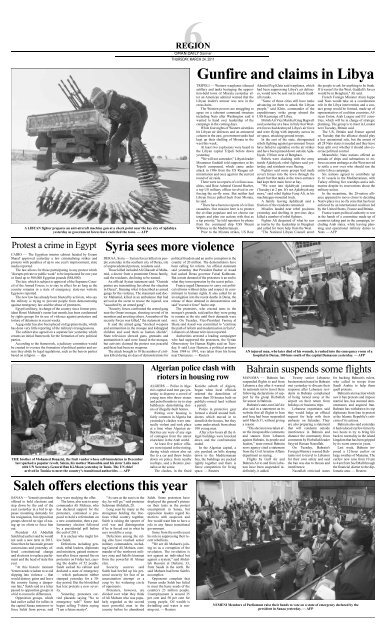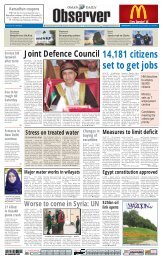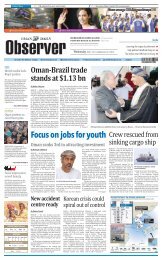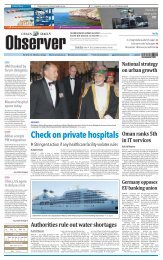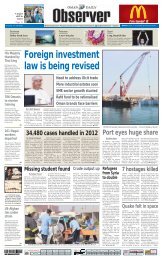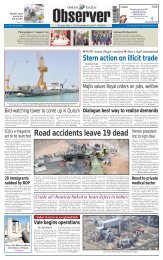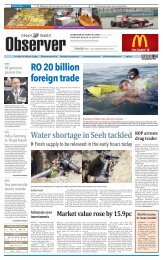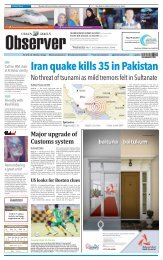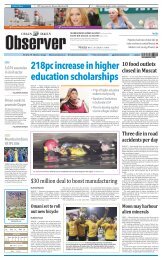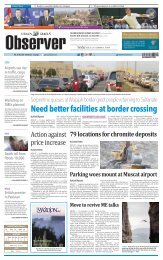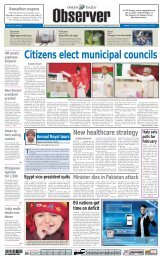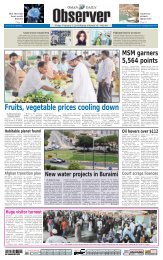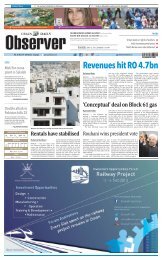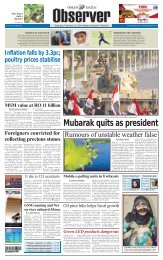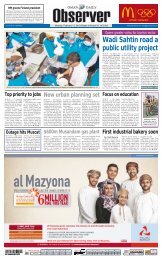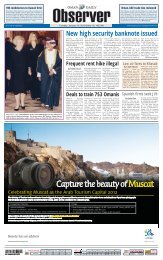Pension benefits raised - Oman Daily Observer
Pension benefits raised - Oman Daily Observer
Pension benefits raised - Oman Daily Observer
You also want an ePaper? Increase the reach of your titles
YUMPU automatically turns print PDFs into web optimized ePapers that Google loves.
A LIBYAN fighter prepares an anti-aircraft machine gun at a check point near the key city of Ajdabiya<br />
yesterday as government forces have encircled the town. — AFP<br />
Protest a crime in Egypt<br />
CAIRO — The Egyptian interim cabinet headed by Essam<br />
Sharaf approved yesterday a law criminalising strikes and<br />
protests with penalties of up to one year's imprisonment, state<br />
media reported.<br />
The law allows for those participating in any protest which<br />
"disrupts private or public work" to be imprisoned for one year<br />
or fined up to 500,000 Egyptian pounds ($84,000).<br />
The law, which is subject to approval of the Supreme Council<br />
of the Armed Forces, is to stay in effect for as long as the<br />
country remains in a state of emergency, state-run website<br />
Egynews reported.<br />
The new law has already been blasted by activists, who say<br />
the military is trying to prevent people from demonstrating<br />
against emergency law and the abuse of protesters.<br />
Egypt's military, in charge of the country since former president<br />
Hosni Mubarak's ouster last month, has been condemned<br />
by rights groups for its use of violence against protesters and<br />
torture of detainees in recent weeks.<br />
A gag order has also been placed on Egyptian media, which<br />
has done very little reporting of the military's transgressions.<br />
The cabinet also agreed on a separate law yesterday which<br />
creates an initial framework for the formation of new political<br />
parties.<br />
According to the framework, a judiciary committee would<br />
be created to oversee the formation of political parties and ensure<br />
they abide by legal regulations, such as the ban on parties<br />
based on religion. — dpa<br />
DERAA, Syria — Syrian forces killed six people<br />
yesterday in the southern city of Deraa, site<br />
of unprecedented protests, residents said.<br />
Those killed included Ali Ghassab al Mahamid,<br />
a doctor from a prominent Deraa family,<br />
said the residents, declining to be named.<br />
An official Syrian statement said: "Outside<br />
parties are transmitting lies about the situation<br />
in Deraa", blaming what it described as armed<br />
gangs for the violence. The statement said doctor<br />
Mahamid, killed in an ambulance that had<br />
arrived at the scene to rescue the injured, was<br />
"assaulted by an armed gang".<br />
"Security forces confronted the armed gang<br />
near the Omari mosque, shooting several of its<br />
members and arresting others. A member of the<br />
security forces was killed," the statement said.<br />
It said the armed gang "stocked weapons<br />
and ammunition in the mosque and kidnapped<br />
children and used them as human shields".<br />
State television showed guns, grenades and<br />
ammunition it said were found in the mosque,<br />
but activists claimed the protest was peaceful<br />
and there had been no weapons.<br />
The attack brought to 10 the number of civilians<br />
killed during six days of demonstrations for<br />
THE brother of Mohamed Bouazizi, the fruit vendor whose self-immolation in December<br />
last sparked a popular revolt, Salem, his mother Manoubia and his sister Leila meet<br />
with UN Secretary-General Ban Ki-Moon yesterday in Tunis. The UN chief<br />
arrived in Tunisia to meet the country’s transitional authorities. — AFP<br />
SANAA — Yemen's president<br />
offered to hold elections and<br />
step down by the end of the<br />
year yesterday in a bid to appease<br />
mounting demands for<br />
his resignation, but opposition<br />
groups showed no sign of easing<br />
up on eforts to force him<br />
out.<br />
President Ali Abdullah<br />
Saleh had earlier said he would<br />
not seek a new term in 2013.<br />
Since then he has made greater<br />
concessions and yesterday offered<br />
constitutional change<br />
and elections to replace parliament<br />
and the head of state this<br />
year.<br />
"At this historic moment<br />
Yemen needs wisdom to avoid<br />
slipping into violence ... that<br />
would destroy gains and leave<br />
the country facing a dangerous<br />
fate," Saleh said in a letter<br />
passed to opposition groups in<br />
a bid to reconcile differences.<br />
Opposition groups, which<br />
had earlier called for rallies in<br />
the capital Sanaa tomorrow to<br />
force Saleh from power, said<br />
they were studying the offer.<br />
The letter, also sent to army<br />
commander Ali Mohsen, who<br />
has declared support for the<br />
protesters, contained a proposal<br />
to hold a referendum on<br />
a new constitution, then a parliamentary<br />
election followed<br />
by a presidential poll before<br />
the end of 2011.<br />
It is unclear who might follow<br />
Saleh.<br />
Defections including generals,<br />
tribal leaders, diplomats<br />
and ministers, gained momentum<br />
after forces opened fire on<br />
protesters on Friday last, causing<br />
the deaths of 52 people.<br />
Saleh sacked his cabinet and<br />
declared a state of emergency<br />
— which parliament rubber<br />
stamped yesterday for a 30day<br />
period. But the bloodshed<br />
has lent protests a new severity.<br />
Yesterday, protesters carried<br />
placards saying "No to<br />
emergency rule!" Some had<br />
begun selling T-shirts saying<br />
"I am a future martyr".<br />
6 REGION<br />
OMAN DAILY <strong>Observer</strong><br />
THURSDAY, MARCH 24, 2011<br />
Gunfire and claims in Libya<br />
TRIPOLI — Western warplanes silenced<br />
artillery and tanks besieging the opposition-held<br />
town of Misrata yesterday after<br />
an American admiral warned that the<br />
Libyan leader's armour was now in the<br />
cross-hairs.<br />
The Western powers are struggling to<br />
agree on a coherent command structure<br />
including Nato after Washington said it<br />
wanted to hand over leadership of the<br />
campaign in the coming days.<br />
While four nights of Western airstrikes<br />
hit Libyan air defences and an armoured<br />
column in the east, government tanks had<br />
kept up their shelling of Misrata in the<br />
west this week.<br />
At least two explosions were heard in<br />
the Libyan capital Tripoli before dawn<br />
yesterday.<br />
"We will not surrender," Libyan leader<br />
Moammar Gaddafi told supporters at his<br />
Tripoli compound, which came under<br />
attack in 1986 from the US Reagan administration<br />
and once again in the current<br />
round of air raids.<br />
There were no reports of civilian casualties,<br />
said Rear Admiral Gerard Hueber,<br />
a top US military officer involved in enforcing<br />
the no-fly zone. But neither had<br />
Libyan forces pulled back from Misrata,<br />
he said.<br />
"There have been no reports of civilian<br />
casualties. Our mission here is to protect<br />
the civilian populace and we choose our<br />
targets and plan our actions with that as<br />
a top priority," he told reporters by phone<br />
from the command ship USS Mount<br />
Whitney in the Mediterranean.<br />
Prior to the Misrata strikes, US Rear<br />
Syria sees more violence<br />
Saleh offers elections this year<br />
"As sure as the sun is in the<br />
sky, he will go," said protester<br />
Suleiman Abdullah, 28.<br />
Long seen by many as the<br />
strongman holding the fractious<br />
tribal country together,<br />
Saleh is raising the spectre of<br />
civil war and disintegration<br />
if he is forced out in what he<br />
says would be a coup.<br />
Defections among the ruling<br />
elite have reached senior<br />
military commanders, including<br />
General Ali Mohsen, commander<br />
of the northwest military<br />
zone and Saleh's kinsman<br />
from the powerful Al Ahmar<br />
clan.<br />
Security sources said<br />
Saleh had beefed up his personal<br />
security for fear of an<br />
assassination attempt or a<br />
coup by his widening circle<br />
of opponents.<br />
Protesters, however, are<br />
divided over what they think<br />
of Ali Mohsen who was popularly<br />
regarded as the second<br />
most powerful man in the<br />
country before he abandoned<br />
Saleh. Some protesters have<br />
displayed the general's picture<br />
on their tents in the protest<br />
encampment in Sanaa, but<br />
opposition leaders regard his<br />
motives with suspicion and<br />
few would want him to have a<br />
role in any future transitional<br />
government.<br />
Some from the north resent<br />
his role in suppressing their recent<br />
rebellions.<br />
"We see Ali Mohsen's joining<br />
us as a corruption of the<br />
revolution. The revolution is<br />
not against an individual but<br />
against a system," said Abdullah<br />
Hussein al Dailami, 33,<br />
from Saada in the north. He<br />
said Mohsen had been Saleh's<br />
accomplice.<br />
Opponents complain that<br />
Yemen under Saleh has failed<br />
to meet the basic needs of the<br />
country's 23 million people.<br />
Unemployment is around 35<br />
per cent and 50 per cent for<br />
young people. Oil wealth is<br />
dwindling and water is running<br />
out. — Reuters<br />
political freedom and an end to corruption in the<br />
country of 20 million. The demonstrators have<br />
been calling for reform. An official statement<br />
said yesterday that President Bashar al Assad<br />
had sacked Deraa governor Faisal Kalthoum.<br />
But a main demand of the protesters is an end to<br />
what they term repression by the secret police.<br />
France urged Damascus to carry out political<br />
reforms without delay and respect its commitment<br />
to human rights. It also called for an<br />
investigation into the recent deaths in Deraa, the<br />
release of those detained in demonstrations and<br />
said "excessive force" had to stop.<br />
The protesters, who erected tents in the<br />
mosque's grounds, said earlier they were going<br />
to remain at the site until their demands were<br />
met. On Tuesday, Vice-President Farouq al<br />
Shara said Assad was committed to "continue<br />
the path of reform and modernisation in Syria",<br />
Lebanon's al-Manar television reported.<br />
Authorities arrested a leading campaigner<br />
who had supported the protesters, the Syrian<br />
Observatory for Human Rights said on Tuesday.<br />
It said Loay Hussein, a political prisoner<br />
from 1984 to 1991, was taken from his home<br />
near Damascus. — Reuters<br />
Algerian police clash with<br />
rioters in housing row<br />
ALGIERS — Police in Algeria's<br />
capital used tear gas yesterday<br />
to disperse a crowd of<br />
young men who threw stones<br />
and petrol bombs to try to stop<br />
bulldozers demolishing dozens<br />
of illegally-built homes.<br />
Rioting over housing is<br />
fairly common in Algeria but<br />
yesterday's clashes were unusually<br />
violent and took place<br />
at a time when Algerian authorities<br />
are wary of any sign<br />
of contagion from the unrest<br />
elsewhere in the Arab world.<br />
At least five police officers<br />
were injured in the rioting,<br />
during which rioters also set<br />
fire to a car and threw bricks<br />
down on police from nearby<br />
rooftops, said a Reuters journalist<br />
at the scene.<br />
The clashes, in the Oued<br />
Koriche suburb of Algiers,<br />
began when local officials<br />
ordered the demolition of<br />
more than 30 houses built on<br />
publicly-owned land without<br />
a permit.<br />
Police in protective gear<br />
formed a shield around bulldozers<br />
which moved in to<br />
demolish the houses, but they<br />
came under attack from about<br />
100 young men.<br />
After a few hours all the illegal<br />
buildings were knocked<br />
down and the confrontation<br />
ended.<br />
In the Algerian capital, a<br />
city perched on hills sloping<br />
down to the Mediterranean<br />
Sea, the buildings are packed<br />
tightly together and there is<br />
fierce competition for living<br />
space. — Reuters<br />
Admiral Peg Klein said warplanes, which<br />
had been suppressing Libya's air defences,<br />
would now be sent out to attack Gaddafi's<br />
tanks.<br />
"Some of those cities still have tanks<br />
advancing on them to attack the Libyan<br />
people," said Klein, commander of the<br />
expeditionary strike group aboard the<br />
USS Kearsarge off Libya.<br />
British Air Vice Marshal Greg Bagwell<br />
said yesterday at a base in Italy that Western<br />
forces had destroyed Libya's air force<br />
and were flying with impunity across its<br />
air space, attacking ground troops.<br />
In the east of the state, disorganised<br />
rebels fighting against government forces<br />
have failed to capitalise on the air strikes<br />
and have been pinned down outside Ajdabiyah,<br />
150 km west of Benghazi.<br />
Rebels were clashing with the army<br />
inside Ajdabiyah, rebel fighters said yesterday,<br />
and residents were fleeing.<br />
Fighters said some groups had made<br />
covert forays into the town through the<br />
desert but that tanks at the town entrance<br />
had kept their main force at bay.<br />
"We went into Ajdabiyah yesterday<br />
(Tuesday) at 2 pm. It's not Ajdabiyah any<br />
more," said rebel fighter Faraj Ali, in his<br />
machinegun-mounted truck.<br />
A family leaving Ajdabiyah said a<br />
fraction of the residents remained.<br />
Missiles landed near rebel positions<br />
yesterday and shelling in previous days<br />
killed a number of rebel fighters.<br />
Fighter Ali despaired of what he saw<br />
as inertia by the leadership in Benghazi<br />
and called for more help from the West.<br />
"The National Libyan Council aren't<br />
MANAMA — Bahrain has<br />
suspended flights to and from<br />
Lebanon a day after it warned<br />
its nationals not to travel there<br />
following declarations of support<br />
by the group Hizbullah<br />
for unrest in Bahrain.<br />
Bahrain's state-run Gulf Air<br />
also said in a statement on its<br />
website that all flights to Iran<br />
and Iraq had been suspended<br />
until March 31, without giving<br />
a reason.<br />
"This decision was taken after<br />
the irresponsible comments<br />
and stances from Lebanon<br />
against Bahrain, its people and<br />
leaders," state-owned Bahrain<br />
news agency cited a statement<br />
from the Civil Aviation Affairs<br />
department as saying.<br />
Flights by Gulf Air and<br />
Bahrain Air to and from Lebanon<br />
have been suspended indefinitely,<br />
it added.<br />
Twenty senior Lebanese<br />
businessmen based in Bahrain<br />
met yesterday to discuss their<br />
response after Lebanese residents<br />
in Bahrain complained<br />
of being turned away at the<br />
airport on their return from<br />
holidays or business trips.<br />
Lebanese expatriates said<br />
they would lodge an official<br />
request for help with their<br />
embassy on Saturday. They<br />
are also preparing a statement<br />
that will condemn outside<br />
interference in Bahrain and<br />
distance the community from<br />
comments by Hizbullah leader<br />
Sayyed Hassan Nasrallah.<br />
On Tuesday, Bahrain's<br />
Foreign Ministry warned Bahrainis<br />
not to travel to Lebanon<br />
for their own safety and said<br />
the ban was due to threats and<br />
interference.<br />
Nasrallah criticised states<br />
the people to ask for anything to be frank.<br />
If it weren't for the West, Gaddafi's forces<br />
would be in Benghazi," Ali said.<br />
French Foreign Minister Alain Juppe<br />
said Nato would take on a coordination<br />
role in the Libya intervention and a contact<br />
group would be formed, made up of<br />
representatives of coalition countries, African<br />
Union, Arab League and EU countries,<br />
which will be in charge of strategic<br />
planning. The group is to meet in London<br />
next Tuesday, Britain said.<br />
The US, Britain and France agreed<br />
on Tuesday that the alliance should play<br />
a key operational role, but the assent of<br />
all 28 Nato states is needed and they have<br />
been split over whether it should also exercise<br />
political control.<br />
Meanwhile, Nato nations offered an<br />
armada of ships and submarines to enforce<br />
an arms embargo as the West moved<br />
to settle a row over who should run the<br />
entire Libya campaign.<br />
Six nations agreed to contribute up<br />
to 16 vessels in the Mediterranean, with<br />
Turkey offering five warships and a submarine<br />
despite its reservations about the<br />
military action.<br />
In the meantime, the 28-nation alliance<br />
appeared to move closer to deciding<br />
Nato's place in a no-fly zone that has been<br />
enforced by an international coalition led<br />
by the United States, France and Britain.<br />
France wants political authority to rest<br />
in the hands of a committee made up of<br />
countries taking part in the campaign, including<br />
Arab states, while leaving planning<br />
and operational military duties to<br />
Nato. — AFP<br />
AN injured man, who later died of his wounds, is rushed into the emergency room of a<br />
hospital in Daraa, 100 kms south of the capital Damascus yesterday. — AFP<br />
Bahrain suspends some flights<br />
for backing Bahrain's rulers,<br />
who called in troops from<br />
Saudi Arabia to help them<br />
quell protests.<br />
Bahrain's stern action which<br />
saw it ban protests and impose<br />
martial law, has stunned demonstrators<br />
and angered Iran.<br />
Bahrain has withdrawn its top<br />
diplomats from Iran in protest<br />
at the Islamic Republic's criticism<br />
of its actions.<br />
Bahrain also said yesterday<br />
it had reduced curfew times by<br />
two hours to try to bring life<br />
back to normality in the island<br />
kingdom that has been gripped<br />
by its worst unrest in years.<br />
Last week, Bahrain imposed<br />
a 12-hour curfew on<br />
large swathes of Manama. The<br />
curfew now runs from 10 pm<br />
to 4 am from Seef Mall through<br />
the financial district to the diplomatic<br />
area. — Reuters<br />
YEMENI Members of Parliament raise their hands to vote on a state of emergency declared by the<br />
president in Sanaa yesterday. — AFP


